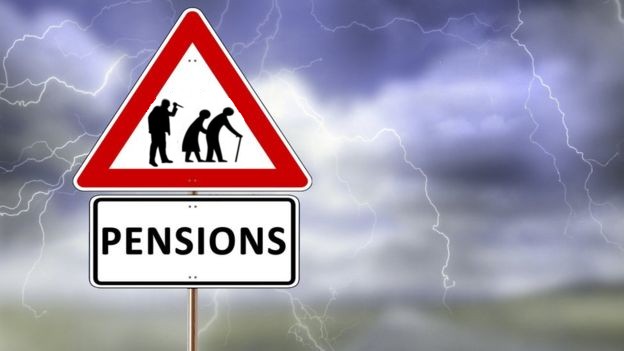Is he or isn’t he? The cut-price PM’s peek-a-boo pensions policy
The short answer is he isn’t – if you can believe what Rishi Sunak said during Prime Minister’s Questions.
Asked if he was committed to the pension’s triple-lock, that commits the government to increasing pensions each year by the highest of 2.5 per cent, inflation, or average wages, Sunak said:
“This is the Government who introduced and remain committed to the triple lock.”
That means pensions should rise by 8.5 per cent – the average annual wage increase recorded in the summer months.
But Work and Pensions Secretary Mel Stride had previously refused to commit to this, and it is rumoured that he wants to strip out the effect of one-off bonuses paid to public sector workers, to bring the increase down to 7.8 per cent.
It’s an argument reminiscent of that used back in September 2021, when a huge fall in earnings caused by the Covid pandemic was followed by a similarly whopping rise when everybody went back to work and their pay packets re-balanced.
The real-terms change in that case was negligible, but the rule does not take account of falls in income – only of increases.
The suspension of the triple-lock in that year was halted in the House of Lords, when Baron Prem Sikka demonstrated that it would result in a loss of more than £30 billion to pensioners by 2027:
DAYLIGHT ROBBERY: UK govt admits that suspension of the triple-lock will rob retirees of £5.4bn of pensions in 2022/23, £5,78bn in 2023/24, £6.1bn in 2024/25, £6.5bn in 2025/26 and £6.7bn in 2026/27, totalling £30.5bn over 5yrs (see page 136 of the link).https://t.co/yoDIiMbSsd
— Prem Sikka (@premnsikka) November 2, 2021
Suspending the triple-lock would also have broken a Tory manifesto promise – as it will if Sunak does it this year.
In fact, This Writer was not particularly impressed with any of the arguments about pensions back in 2021 because I thought a simple cost-of-living increase would have been more in spirit with the intention of the triple-lock.
No – my argument with what the Tories were doing was more holistic than that; I looked at the wider issue of how much the UK pays in pensions, and found that the people were being short-changed. Here’s what I said then:
The point is that the UK state pension is one of the worst pension deals in the whole world.
On retirement, our pensioners will receive, on average, 29 per cent of their former earnings. This compares with an increase of 0.6 per cent in the Netherlands, more than 90 per cent of former earnings in Portugal, Italy and Austria, and an OECD (Organisation of Economic Co-operation and Development) nations’ average of nearly 63 per cent.
In fact, the UK’s pensions deal comes in at slightly worse than that provided in… Mexico.
This was a chance to level up the UK pension with some of our closest neighbours – but the Tories didn’t want to. That’s why people should be angry.
Some of the figures may have changed since then – but I doubt the UK’s position relative to other countries has.
Mine certainly hasn’t. How about yours?
Ultimately, of course, this is just part of Sunak’s quest to find which sector of society he can most comfortably penalise in order to give a big tax break to rich and influential people, so they will then persuade or coerce enough of the wider electorate to vote in another Tory government at the next election.
I still reckon that, rather than attacking pensioners or people on Universal Credit (which will include employees), the axe will fall on sick and disabled people, because they are least able to defend themselves. As usual.



💬 Thanks for reading! If this article helped you see through the spin, please:
🔁 Like this article? Share it or comment — it helps more than you know.
The 1970s born ladies with pension age rise from 60 to 67 from Labour’s 2007 pension act, who are also the current victims of loss of early works pension age from 50 to 55 (soon to rise to 57, originally came from Labour’s 2004 Finance Act), are also the victims of the coming worsening of attack on the chronic sick and disabled coming next year and after next general election in 2025 (by making it harder to get onto the sick support benefit, not requiring having to seek work). UK has amongst the rich nations’ highest number of people from age 50 who fall out of work due to ill health. Not least by severe menopause.
Triple lock yearly rise comes from within National Insurance Fund and not general taxation, and NI rose 5.8 per cent between boss and worker from April 2016, from most waged ladies and half of salaried men.
Hundreds of thousands of men and women are not getting the flat rate new state pension, that is neither flat nor single tier (as those able to claim both state pensions, can still be new claimants). From small print in the flat rate that came from huge numbers of working class being taken out of 2nd state pension by Labour’s Prime Minister Callaghan from 1978 onwards.
First victims of new flat rate’s reductions were the 1950s born ladies, depriving us of thousands of pounds a year, even if we had more than the raised requirement of 30 to 35 years for full NI record (itself discriminatory to women who could not in last century get sufficient NI record).
Seeking volunteer admin (costs you nothing but your time) to bring into existence oven ready new party brand that would secure the existence of the state pension (under attack by all governments, Tory, Labour and Lib Dems since late 1970s) and end the rich peoples’ tax break in worker National Insurance for the top waged / rich.
Please contact through website
http://www.over50sparty.org.uk